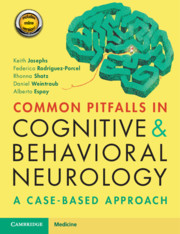Book contents
- Common Pitfalls in Cognitive and Behavioral Neurology
- Common Pitfalls in Cognitive and Behavioral Neurology
- Copyright page
- Dedication
- Contents
- Diseases Discussed in the Book
- Preface
- Acknowledgements
- Abbreviations
- Part 1 Missing the Diagnosis Altogether
- Part 2 Misidentifying the Impaired Cognitive Domain
- Part 3 Missing Important Clues in the History
- Case 11 The Stroke of Clarity
- Case 12 Losing One’s Mind without Knowing?
- Case 13 The Disease Has Caught Up with Her
- Case 14 Recognizing the Right Signs of Memory Impairment
- Case 15 Talking about Family Matters
- Part 4 Failure of Pattern Recognition
- Part 5 Difficult-to-Characterize Cognitive/Behavioral Disorders
- Part 6 Clinical Findings That Are Subtle
- Part 7 Misinterpreting Test Results
- Part 8 Attributing Findings to a Known or Suspected Disorder
- Part 9 Missing Radiographic Clues
- Part 10 Management Misadventures
- Index
- Plate Section (PDF Only)
- References
Case 12 - Losing One’s Mind without Knowing?
from Part 3 - Missing Important Clues in the History
Published online by Cambridge University Press: 03 November 2020
- Common Pitfalls in Cognitive and Behavioral Neurology
- Common Pitfalls in Cognitive and Behavioral Neurology
- Copyright page
- Dedication
- Contents
- Diseases Discussed in the Book
- Preface
- Acknowledgements
- Abbreviations
- Part 1 Missing the Diagnosis Altogether
- Part 2 Misidentifying the Impaired Cognitive Domain
- Part 3 Missing Important Clues in the History
- Case 11 The Stroke of Clarity
- Case 12 Losing One’s Mind without Knowing?
- Case 13 The Disease Has Caught Up with Her
- Case 14 Recognizing the Right Signs of Memory Impairment
- Case 15 Talking about Family Matters
- Part 4 Failure of Pattern Recognition
- Part 5 Difficult-to-Characterize Cognitive/Behavioral Disorders
- Part 6 Clinical Findings That Are Subtle
- Part 7 Misinterpreting Test Results
- Part 8 Attributing Findings to a Known or Suspected Disorder
- Part 9 Missing Radiographic Clues
- Part 10 Management Misadventures
- Index
- Plate Section (PDF Only)
- References
Summary
This 57-year-old right-handed woman presented to the clinic after four episodes of amnesia. The first one occurred six months previously while at her daughter’s house. Abruptly, she became disoriented to location and situation. She knew who she was and could recognize her daughter. She was reoriented by her daughter multiple times but still repeatedly asked where she was. She was taken to the emergency room, and after 45 minutes, she returned to her baseline and could recall the episode of disorientation. Her neurological exam was unremarkable, as well as her laboratory investigations, brain MRI, and EEG. She was discharged back home with the diagnosis of transient global amnesia (TGA). She had three additional episodes of similar characteristics since then, all within the last two months. She was on treatment with amlodipine for hypertension. Her repeat exam in the office setting was unremarkable.
Information
- Type
- Chapter
- Information
- Common Pitfalls in Cognitive and Behavioral NeurologyA Case-Based Approach, pp. 38 - 39Publisher: Cambridge University PressPrint publication year: 2020
